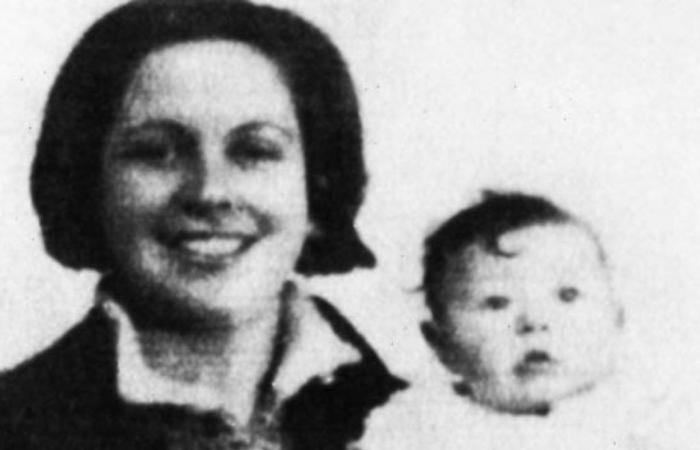
The Executive of Pedro Sánchez has announced this Wednesday that it is considering legal action against the president of the Balearic Parliament, Gabriel Le Senne (Vox), who on Tuesday, during a plenary session, tore a photo with images of victims of the Civil War from the lectern of the second vice president of the Board. The Parliament of the Balearic Islands approved in that session, with votes in favor of the PP and Vox, the taking into consideration of a bill presented by the extreme right to repeal the autonomous law of Democratic Memory and Recognition. The photograph that Le Senne took corresponds to Aurora Picornell. Who was Picornell and why was her image exposed by the socialist deputy?
Known as The Mallorcan Passionflower, She was murdered by the Franco regime on Twelfth Night in 1937. A dressmaker by profession, she was responsible for the women’s organization of the Communist Party in the Balearic Islands. In the first days of the coup d’état that gave rise to the Civil War she was arrested, imprisoned and made to disappear with her other companions. She was the night of January 5, 1937. She was 25 years old, married and the mother of a little girl. Just as she remembers The Mallorca Diary This Wednesday, she was captured in July 1936, while she was taking refuge in a house in Palma. From there she was transferred to a Francoist women’s prison and, six months later, the person in charge of it shouted her name along with three of her other companions:
-Come out, they ask for it.
The Picornell family is a paradigm of Franco’s brutal repression. The father, Gabriel Picornell, a carpenter, was also murdered in Porreres in January 1937. He was a member of the Socialist Party and in the 1920s he was one of the promoters of the Palma Communist Group. He married Joana Femenías and they had seven children, three of whom – Aurora, Gabriel and Ignasi – were murdered. The youngest, Joan, managed to flee to France during the Civil War, but ended up in a Nazi concentration camp in Dachau (Germany) and also died shortly after his release due to the harsh living conditions in the camp. Her sister Llibertat left Mallorca at the age of 15 and went into exile first in Mexico and then in France, where she spent the rest of her life.
Picornell’s remains were found by the Balearic Government in 2022 after an exhumation in a mass grave in the Son Coletes cemetery. “Today is a historic day,” declared the then Balearic vice president, Juan Pedro Yllanes. “We are very proud to have found her because her executioners wanted to erase her from history, but they did not get their way. “Aurora is coming home.”
The remains, as forensic archaeologist Almudena García-Rubio, from the Aranzadi science society, explained that morning, showed three gunshot wounds to the skull, as well as a rib, and the ulna and radius of the left arm. Between the bones, at the height of the thorax, a fountain pen appeared. Trade unionist and feminist, Picornell was the promoter of Working Women’s Day in Mallorca.
What affects the most is what happens closest. So you don’t miss anything, subscribe.
Subscribe
On January 28, 2023, his remains were delivered to his family in a very emotional ceremony. “History cannot be built from oblivion,” said Picornell’s nephew, Jorge Molinero Picornell, after taking the stand, in a chronicle collected by elDiario.es.
The scene in the Balearic Parliament
Picornell’s image was placed this Tuesday in front of a computer by a socialist deputy, who is part of the Board, during a plenary session in the Balearic Parliament. The president of Parliament, from Vox and visibly upset, told him: “To preserve the neutrality of the Board, I order you to remove those portraits from your computers.” The socialist deputy asks: “Based on what articles?”
“I call you to order for the first time,” insists the president. “I beg you to remove those portraits.” You’ve had them for quite some time, please remove them.
―These portraits are here as an act of justice.
After calling for order for the second and third time, the president of the Chamber orders the socialist deputies to leave the room and fiercely tears away the photographs. Garrido protests: “You can’t touch my computer, president!” But he insists: “Leave the room.”
The two parliamentarians leave the chamber amid complaints from the socialist parliamentary group. Le Senne insists: “Keep silent or I will expel more people. The Board must be neutral.”
The attitude of the Vox leader reached the Congress of Deputies this Wednesday, where the Government control session was being held. Pedro Sánchez said, during his turn to reply to the leader of the PP, Alberto Núñez Feijóo, that Le Senne’s behavior was “execrable”, and added that he “deserves disapproval and [petición de] resignation” of the parliamentary majority that the PP and Vox have in the Balearic Islands.
Subscribe to continue reading
Read without limits
_





